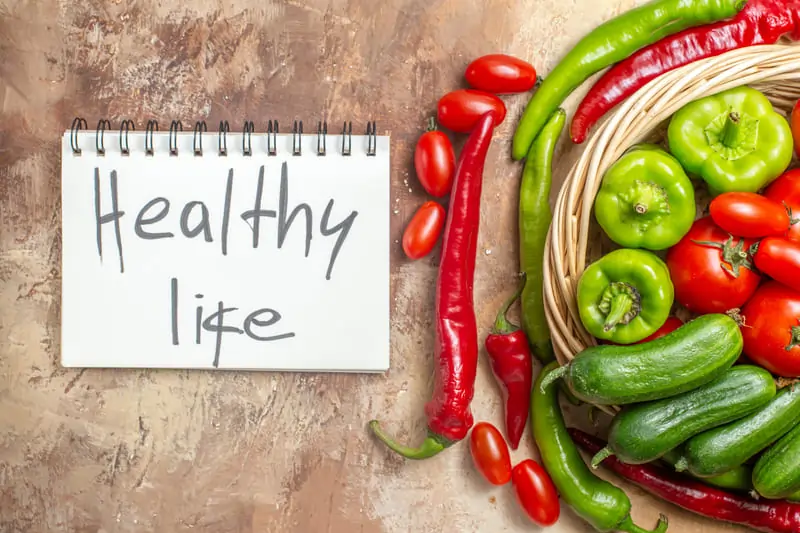For instance, red peppers are especially high in Vitamin C, a nutrient vital for immune health and skin regeneration. According to research on Vitamin C benefits, peppers provide one of the highest natural sources of this antioxidant, contributing significantly to overall wellness.
Nutritional Profile of Peppers
Peppers are a nutritional powerhouse, offering a wide range of essential vitamins, minerals, and antioxidants while remaining low in calories. Their nutrient-dense profile makes them a perfect addition to any balanced diet, whether as a main ingredient or a flavorful side.
Nutritional Highlights
The eating peppers nutritional benefits stem from their low calorie count and high levels of vitamins and minerals. A 100-gram serving of bell peppers provides:
- Vitamin C: 213% of the daily value.
- Vitamin A: 157% of the daily value.
- Fiber: 1.7g to promote gut health.
For more insights into nutrient-rich vegetables, visit Should You Peel Eggplant for Eggplant Parmesan? to learn about preparation techniques that retain vital nutrients.
Antioxidants and Their Benefits
Peppers are also packed with antioxidants, such as beta-carotene and flavonoids, which combat oxidative stress and reduce the risk of chronic illnesses. These compounds play a role in:
- Heart Health: Protecting blood vessels from oxidative damage and reducing inflammation, key factors in preventing heart disease.
- Cancer Prevention: Neutralizing free radicals that can lead to cell damage and increase cancer risk.
- Skin Health: Supporting collagen production and protecting skin from environmental damage.
For a delicious way to enjoy these benefits, try incorporating peppers into recipes like Old-Fashioned Stuffed Bell Peppers, which combine flavor and nutrition effortlessly.
Incorporating Peppers into Your Diet
Peppers’ low-calorie content and high nutrient density make them ideal for healthy meals. Their versatility allows them to shine in:
- Raw Dishes: Add sliced bell peppers to salads for a crisp texture and burst of flavor.
- Cooked Dishes: Roast, grill, or sauté peppers to release their natural sweetness while preserving nutrients.
- Stuffed Recipes: Use them as a base for hearty dishes filled with grains, beans, or proteins. Check out Vegan Eggplant Parmesan: A Wholesome and Delicious Twist for inspiration on using vegetables creatively.
Benefits of eating peppers
Peppers are more than just a flavorful addition to your meals—they also provide a wide range of health benefits that make them a valuable part of any diet. From boosting immunity to supporting metabolism, peppers offer numerous advantages for overall well-being.
1. Boosting Immunity and Skin Health
- Rich in Vitamin C: Peppers are an excellent source of Vitamin C, a nutrient vital for strengthening the immune system. A single serving of red bell peppers provides more Vitamin C than an orange, helping your body fight off infections and supporting wound healing.
- Promoting Skin Health: Vitamin C also plays a key role in collagen production, which maintains skin elasticity and reduces the appearance of wrinkles. For more ideas on incorporating nutrient-rich vegetables, visit Should You Peel Eggplant for Eggplant Parmesan?, which emphasizes vegetable preparation techniques that retain skin-benefiting nutrients.
- Vision and Immunity Benefits: Vitamin A, abundant in red and yellow peppers, supports good vision and enhances immune response. These colorful peppers are especially beneficial for maintaining eye health and protecting against age-related macular degeneration.
2. Antioxidant Properties OF Benefits of eating peppers
- Neutralizing Free Radicals: Peppers are packed with antioxidants like beta-carotene and flavonoids, which help combat oxidative stress. These compounds reduce inflammation and lower the risk of chronic diseases, including heart disease and certain cancers.
- Choosing Red Over Green: Red peppers contain significantly more beta-carotene than green peppers, making them an even more potent choice for an antioxidant-rich diet. Antioxidants also contribute to slowing down the aging process by protecting cells from damage.
- To enjoy peppers’ antioxidant benefits in creative ways, try recipes like Old-Fashioned Stuffed Bell Peppers, which combine rich flavors with healthful ingredients.
3. Capsaicin and Metabolism
- Boosting Metabolism: Spicy peppers, such as jalapeños and habaneros, owe their heat to a compound called capsaicin. This natural substance has been shown to increase energy expenditure and fat oxidation, making it a helpful addition to weight management diets.
- Reducing Appetite: Capsaicin may also help curb appetite, reducing calorie intake over time. For more information on how spicy ingredients enhance health, explore Rare and Unique Pepper Varieties to discover peppers that pack a flavorful and metabolic punch.
- Anti-Inflammatory Effects: Capsaicin is also known for its anti-inflammatory properties, which can help reduce the risk of conditions like arthritis and support overall joint health.
The Impact on Digestive Health

Peppers play a significant role in supporting digestive health, thanks to their rich nutrient profile and natural compounds. From promoting regular bowel movements to enhancing nutrient absorption, peppers are a valuable addition to a gut-friendly diet.
High Fiber Content for Regularity
- Promoting Healthy Bowel Movements: Peppers are a natural source of dietary fiber, which is essential for maintaining a healthy digestive system. A diet rich in fiber helps prevent constipation by adding bulk to stool and promoting regularity.
- Supporting Gut Health: Fiber also acts as a prebiotic, nourishing the beneficial bacteria in your gut. These bacteria play a critical role in breaking down food, boosting immunity, and producing essential nutrients. For other fiber-rich vegetable options, visit Should You Peel Eggplant for Eggplant Parmesan? to learn about retaining fiber during preparation.
Capsaicin and Gastric Health
- Stimulating Digestive Enzymes: Spicy peppers like jalapeños contain capsaicin, a compound that stimulates the secretion of digestive enzymes. These enzymes enhance nutrient absorption, ensuring that your body gets the most from your meals.
- Aiding in Digestion: Capsaicin also encourages the production of gastric juices, which help break down food more efficiently. This can improve overall digestion and prevent common issues such as bloating or indigestion. To discover more about the benefits of capsaicin, explore Rare and Unique Pepper Varieties for insights into peppers with high capsaicin content.
- Reducing Inflammation: Although known for its heat, capsaicin has anti-inflammatory properties that can soothe the digestive tract and support those with conditions like IBS when consumed in moderation.
Additional Benefits for Gut Health
- Hydration Support: Peppers, especially bell peppers, have a high water content that helps maintain hydration, a key factor in keeping the digestive system functioning smoothly.
- Rich in Antioxidants: The antioxidants in peppers, including beta-carotene and flavonoids, protect the lining of the digestive tract from oxidative damage and inflammation.
For further reading on how fiber supports a healthy gut and overall digestion, visit The Ultimate Guide to Making 5-Ingredient Banana Bread, which highlights the benefits of incorporating fiber-rich foods into your diet. Whether you prefer sweet or spicy varieties, peppers offer a flavorful way to promote digestive health and overall well-being.
Are There Risks to Eating Peppers?

While peppers are packed with health benefits, they can cause discomfort or adverse effects for some individuals. Understanding these risks ensures that you can enjoy peppers safely while making informed dietary choices.
Gastrointestinal Issues
- Heartburn and Indigestion: Spicy peppers, such as jalapeños and habaneros, contain capsaicin, a compound that can irritate the lining of the stomach or esophagus. For individuals prone to acid reflux or indigestion, consuming hot peppers may exacerbate symptoms. If you’re exploring spicy recipes, consider moderation and refer to Rare and Unique Pepper Varieties for tips on selecting milder options.
- Sensitive Stomachs: In some cases, spicy peppers may stimulate excessive gastric acid production, leading to discomfort. Balancing spicy dishes with cooling ingredients like yogurt or coconut milk can help mitigate these effects.
Allergic Reactions
- Potential Allergies: Although rare, some people may experience allergic reactions to peppers. Symptoms can include itching, swelling, or respiratory issues, particularly when handling or consuming raw peppers.
- Cross-Reactivity: Individuals with latex allergies may be more prone to reactions due to similarities in certain plant proteins. To learn about safe preparation methods for vegetables, visit Should You Peel Eggplant for Eggplant Parmesan? for insights into handling sensitive ingredients.
Medication Interactions
- Capsaicin and Medications: Capsaicin, the active compound in spicy peppers, may interact with certain medications, including blood thinners and drugs that affect gastric acid production. For instance, capsaicin can enhance the effects of anticoagulants, potentially increasing the risk of bleeding.
- Consulting a Doctor: Before making significant dietary changes or incorporating large amounts of spicy peppers, it’s important to consult a healthcare provider. They can help assess how peppers might interact with your current medications or health conditions.
Minimizing Risks While Enjoying Peppers
- Start Small: If you’re new to eating spicy peppers, begin with milder varieties such as banana peppers or poblano peppers.
- Remove Seeds and Membranes: These parts contain the highest concentration of capsaicin and can be removed to reduce heat levels.
- Choose Sweet Peppers: Bell peppers offer all the nutritional benefits without the risk of capsaicin-related irritation. For recipes featuring sweet peppers, check out Old-Fashioned Stuffed Bell Peppers, which highlight their mild flavor.
FAQs About Eating Peppers
What Are the Health Eating Peppers Benefits?
Peppers are a nutritional powerhouse, offering a wide range of health benefits. Packed with essential vitamins, antioxidants, and fiber, peppers play a vital role in promoting overall well-being. But what are the specific benefits of peppers, and why should you include them in your diet? Whether you prefer sweet or spicy varieties, peppers provide numerous advantages that make them an excellent addition to any meal.
How Do Different Types of Peppers Vary in Benefits?
- Red Peppers: High in beta-carotene and Vitamin C. Explore how different vegetables can add variety to your diet by checking out this guide to versatile recipes.
- Spicy Peppers: Contain capsaicin, which boosts metabolism and reduces appetite. Curious about healthy snacks that pair well with spicy flavors? Check out this recipe for banana bread cookies.
Can Eating Peppers Improve Digestion?
Yes! Fiber in peppers promotes regularity, and capsaicin stimulates digestive enzymes. However, moderation is key to avoid discomfort. For other fiber-rich food ideas, explore this nutrition guide for gut health.
Are There Risks Associated with Consuming Spicy Peppers?
Excessive consumption of spicy peppers can lead to gastrointestinal discomfort or allergic reactions. Moderation is essential. For additional tips on balancing spices in meals, visit this expert recipe guide.
What Are Easy Ways to Incorporate Peppers Into Meals?
- Add bell peppers to salads for crunch and color.
- Blend roasted red peppers into pasta sauces.
- Spice up omelets with diced jalapeños or habaneros.
For more ideas on incorporating colorful ingredients into your meals, check out this comprehensive recipe list.
Conclusion
Peppers are a nutrient-dense food that supports immunity, digestion, and overall health. From their high Vitamin C content to their antioxidant properties, peppers can transform both your diet and your wellness. Whether you prefer the mild sweetness of bell peppers or the fiery kick of habaneros, incorporating peppers into your meals is a flavorful way to boost your health. Start experimenting today and reap the benefits of these versatile vegetables!

